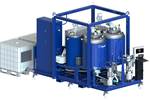Covestro Desmocomp resin offers facade elements efficient thermal insulation
Construction equipment suppliers opt for composites to develop a facade fastening system that is more UV-resistant, sustainable and lightweight than aluminum elements.

The new AFAS Experience Center in Leusden, Netherlands, is equipped with FISCO's facade fastening elements. Photo Credit: AFAS Software
Together with FISCO GmbH (Zusmarshausen, Germany), Dutch construction supplier (Naarden) developed a facade element using composite materials, a force-bearing fixture called the ThermoBracket. After testing several different resin technologies, ’s (Leverkusen, Germany) Desmocomp was found to deliver the best flame resistance, mechanical load and insulation properties.
Typically, standard aluminum fastening systems are used in the construction industry to attach rear-ventilated facades to building structures. Although lightweight and easy to use, they have one main downside: the used aluminum acts as thermal bridge, which has higher thermal conductivity than the surrounding materials. This can cause condensation, which negatively affects the thermal insulation.
“Our composite material is highly resistant to UV radiation, making it ideal for long-term outdoor use,” explains Andreas Hecking, an Aliphatic Composites Specialist at Covestro. “It also meets the high flame retardants requirements for this application, making it attractive to the construction industry.”
An aliphatic polyurethane (PU) composite, Desmocomp is said to have a similar mechanical strength to aluminum, but with thermal conductivity that is 1,000 times lower than a standard metallic product. Further, according to Covestro, only a thin layer is required for sufficient insulating performance, leading to a gain in the usable surface area on the building. Material savings and CO2 reduction are also possible.
Related Content
-
SGL Carbon carbon fiber enables German road bridge milestone
A 64-meter road bridge installed with carbon fiber reinforcement is said to feature a first in modern European bridge construction, in addition to reducing construction costs and CO2 emissions.
-
UMaine ASCC secures $8 million USDOT partnership
Building on its years of work in composites, ARPA-I funding will enable the university to further develop and prototype low-cost composite bridge materials via the X-Bridge program.
-
Composites reinvent infrastructure
Celebrating National Composites Week, CW shares ways in which composites continue to evolve the way we approach infrastructure projects.



